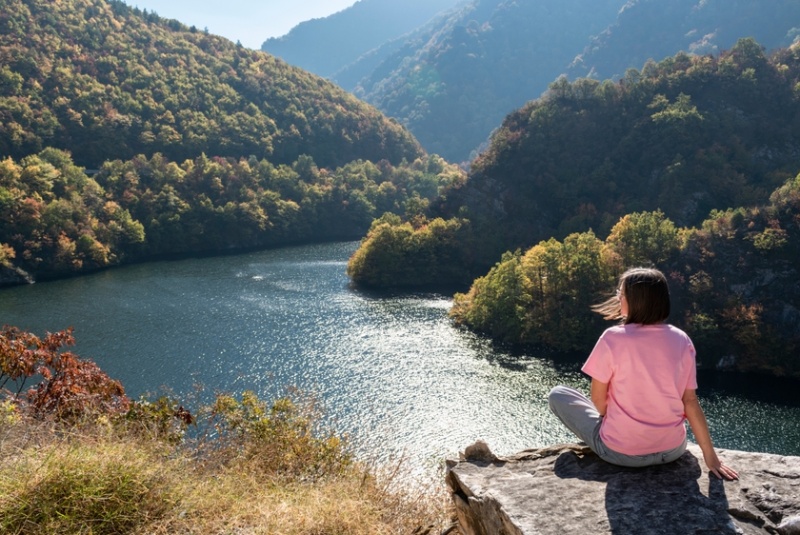Spending time in nature has been shown to significantly improve mental health and reduce stress levels. The calming effects of natural surroundings, such as trees, water, and fresh air, help lower cortisol, the body's stress hormone. Nature therapy, or "ecotherapy," is often used as a treatment for anxiety and depression, as it encourages mindfulness and helps individuals reconnect with the present moment. Whether you're walking through a forest or sitting by a lake, time spent in nature can reduce feelings of tension, alleviate mental fatigue, and promote a sense of peace and well-being, offering a natural escape from daily pressures.
Enhances Physical Health
Being outdoors encourages physical activity, which is essential for maintaining overall health. Activities like hiking, biking, and walking help improve cardiovascular health, strengthen muscles, and enhance flexibility. Exposure to sunlight also allows the body to produce vitamin D, which is crucial for bone health, immune function, and mood regulation. Even a leisurely stroll in a park can increase heart rate and improve circulation. In addition, outdoor activities help combat the sedentary lifestyle that many people experience, offering a natural way to stay active while enjoying the beauty of the environment around you.
Improves Focus and Cognitive Function
Spending time in nature can sharpen your focus and improve cognitive function. Studies have shown that time outdoors can enhance attention span, memory, and problem-solving skills. In particular, natural environments provide relief from mental fatigue and restore the brain's capacity for concentration. Children and adults who struggle with attention deficits, such as ADHD, often benefit from regular exposure to green spaces, as nature allows the brain to reset and focus more effectively. Whether you're working on a creative project or studying for an exam, a break in nature can boost your productivity and mental clarity.
Strengthens the Immune System
Regular exposure to nature has been linked to a stronger immune system. Plants release compounds called phytoncides, which have been shown to increase the activity of natural killer (NK) cells—immune cells that help fight infections and prevent disease. Additionally, spending time outdoors exposes you to a wider variety of beneficial microorganisms, which can improve gut health and immune function. The fresh air and reduced exposure to pollution in natural settings also benefit the respiratory system, making your body more resilient to illnesses. Embracing nature can naturally enhance your body’s defense mechanisms, contributing to long-term health and vitality.
Promotes Better Sleep
Spending time in nature can improve the quality of your sleep by regulating your internal body clock, or circadian rhythm. Exposure to natural light helps synchronize your sleep-wake cycle, making it easier to fall asleep at night and wake up feeling refreshed in the morning. Natural sounds, such as flowing water or rustling leaves, can also have a calming effect on the mind, helping you unwind before bedtime. Additionally, physical activity in the outdoors can tire you out in a healthy way, promoting deeper, more restorative sleep. A day spent in nature can contribute to better rest and a more balanced sleep routine.

Encourages Mindfulness and Presence
Nature provides the perfect setting to practice mindfulness, the act of being fully present in the moment without judgment. The natural world offers a sensory-rich environment that encourages awareness of your surroundings, from the sound of birds to the feel of the wind on your skin. By focusing on these elements, you can cultivate a sense of presence and relaxation, reducing anxiety about the past or future. Mindfulness in nature helps slow down your thoughts, clear mental clutter, and reconnect with yourself. This practice promotes emotional balance and a deeper appreciation for the simple beauty of the natural world.
Fosters Creativity and Inspiration
Time spent in nature has long been a source of inspiration for artists, writers, and innovators. The peaceful and visually stimulating environment allows for mental relaxation, which can lead to creative breakthroughs and fresh ideas. Nature offers an opportunity to disconnect from technology and everyday distractions, creating space for imaginative thinking and problem-solving. Whether you’re sketching the scenery, writing poetry, or brainstorming new concepts, being outdoors can stimulate creative expression and open your mind to new possibilities. If you’re feeling stuck creatively, a walk in the park or a hike in the woods might provide the spark you need.
Builds Stronger Social Connections
Spending time in nature often encourages social interaction, whether through outdoor group activities, family outings, or simply walking through community parks. Engaging in outdoor experiences with others fosters teamwork, communication, and shared enjoyment, which can strengthen relationships. Group hikes, camping trips, and outdoor sports are excellent ways to connect with friends or family while benefiting from the natural environment. In addition, many people find that being in nature creates a sense of belonging and community, making it easier to bond with others. Outdoor social activities help build meaningful connections, enhancing both personal well-being and interpersonal relationships.
Enhances Emotional Resilience
Nature provides a peaceful, nonjudgmental space that allows individuals to reflect on their emotions and develop greater resilience. Spending time outdoors helps people process difficult feelings, providing a sense of calm and perspective that makes it easier to navigate challenges. Nature's rhythm—whether through the changing seasons or the steady flow of a river—reminds us of the cycles of life, encouraging emotional acceptance and strength. This connection with the natural world promotes emotional well-being and fosters the ability to cope with stress, setbacks, and uncertainties, helping individuals cultivate a stronger sense of resilience and inner peace.
Encourages Environmental Stewardship
Spending more time in nature can increase your appreciation for the environment and inspire a greater sense of responsibility for its preservation. When people experience the beauty and diversity of natural landscapes firsthand, they often become more motivated to protect and care for the planet. Engaging with nature can lead to more sustainable habits, such as reducing waste, conserving energy, and supporting conservation efforts. By developing a deeper connection with nature, individuals are more likely to take action in their daily lives to reduce their environmental impact and promote the health of the Earth for future generations.
Spending time in nature offers a multitude of physical, mental, and emotional benefits that enhance overall well-being. From boosting mental health and promoting better sleep to fostering creativity and building social connections, nature provides an invaluable resource for improving quality of life. Whether you're taking a short walk in the park or embarking on a weekend hike, incorporating time in nature into your routine can lead to lasting improvements in health and happiness. By making a conscious effort to connect with the natural world, you can cultivate a more balanced, mindful, and fulfilling life.




